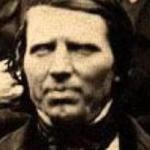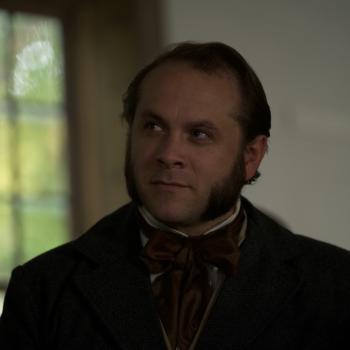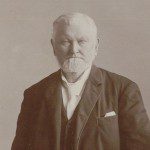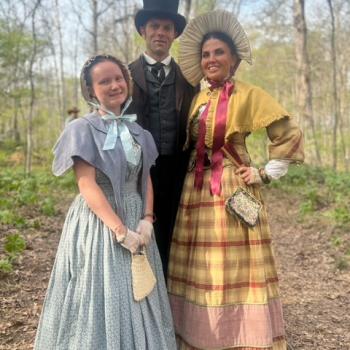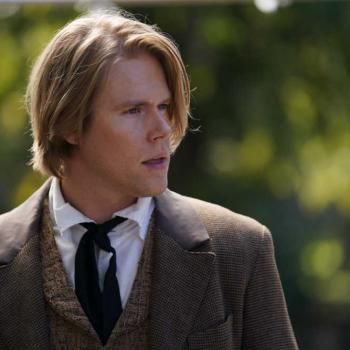
Two new items went up today on the website of the Interpreter Foundation:
- Come, Follow Me — Doctrine and Covenants Study and Teaching Helps (2025) — Doctrine and Covenants 51–57, May 26 – June 1: “A Faithful, a Just, and a Wise Steward” Jonn Claybaugh has generously supplied another concise set of notes for students and teachers of the “Come, Follow Me” curriculum.
- “Interpreter Radio: Come, Follow Me in Context: May 26 – June 1: “A Faithful, a Just, and a Wise Steward” (Doctrine & Covenants 51-57) For the 4 May 2025 Come, Follow Me segment of the Interpreter Radio Show, Martin Tanner, Hales Swift, and Brent Schmidt discussed the Come, Follow Me Doctrine & Covenants lesson for May 26 – June 1 covering D&C 51-57. Their conversation has been edited to remove commercial breaks and is now available to you at no charge but at your convenience. The other segments of the 4 May 2025 radio show can be accessed at https://interpreterfoundation.org/interpreter-radio-show-may-4–2025. In the Salt Lake Valley, the Interpreter Radio Show can be heard live on Sunday evenings from 7 to 9 PM (MDT), on K-TALK, AM 1640, or – whether in the Salt Lake Valley or anywhere else –you can listen live on the Internet at ktalkmedia.com.
I would have to say that, for an inn that’s roughly 450 years old, Ledbury’s Talbot Hotel had very good wifi. Nevertheless, we headed out this morning for Loxhill Farm, which, until about two years ago, was known as “Hill Farm” and which is generally known among Latter-day Saints (but few others) as the “Benbow Farm.” John and Jane Benbow were prominent members of a religious group called the United Brethren, and they became pivotal early English converts to the cause of the Restoration. Wilford Woodruff baptized large numbers of people from the United Brethren in a pond on the Benbows’ farmland that, today, belongs (with a small surrounding plot of ground that is fenced off from a large sheep pasture) to the Church of Jesus Christ of Latter-day Saints. We visited that modest but eternally important little pond this morning.

After a short walking tour of the older part of Ledbury that culminated in the Anglican Church of St. Michael and All Angels, we drove some distance up the side of the Herefordshire Beacon. Most of our group then walked up to its summit for a grand view over all of Herefordshire. (The weather today was splendid — clear and sunny, but not too hot. On 20 May 1840, Elders Wilford Woodruff, Brigham Young, and Willard Richards of the Quorum of the Twelve Apostles climbed the hill, joined in prayer, and held what is sometimes termed the “Beacon Conference.” Elder Young felt prompted to leave the area and to undertake the task of publishing a British edition of the Book of Mormon and a hymnal for the newly baptized Saints in Great Britain.
We closed our day, before we drove on into Wales, with a visit to the Gadfield Elm Chapel. Built by the United Brethren and then given by John Benbow and Thomas Kington, on their behalf, to Wilford Woodruff and the Church, it was the first Latter-day Saint chapel in the British Isles and is, arguably, the oldest Latter-day Saint chapel that still stands. (The Kirtland Temple in Ohio is the oldest Church building altogether, but it’s a temple, not a chapel.)
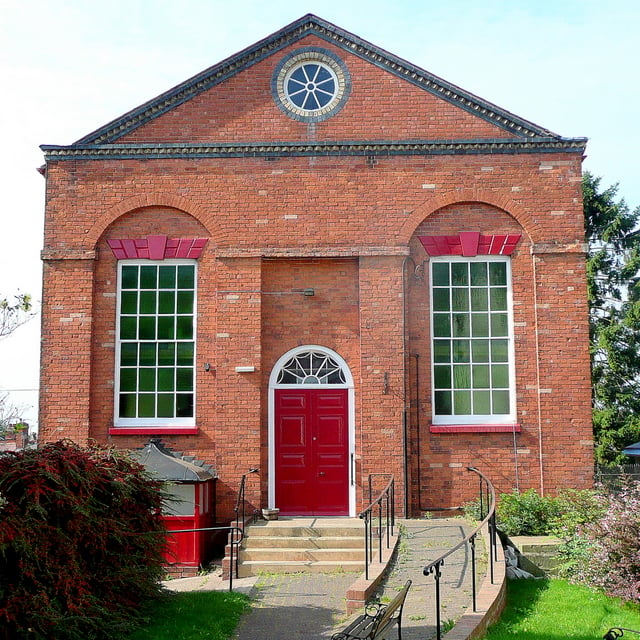
Our British guide, Peter Fagg, read a remarkable story about Phoebe (or Phebe) and Wilford Woodruff to our group on the motor coach today. I’ve read it myself before, but want to share it here. It describes what is, in many ways (though not in all), an impressively standard near-death experience, something that occurred before the 1840 mission of the Twelve to England. Here is how Elder Woodruff himself tells what happened:
On the 23rd of November [1838] my wife, Phoebe, was attacked with a severe headache, which terminated in brain fever. She grew more and more distressed daily as we continued our journey. It was a terrible ordeal for a woman to travel in a wagon over rough roads, afflicted as she was. At the same time our child was also very sick.
The 1st of December was a trying day to my soul. My wife continued to fail, and in the afternoon, about 4 o’clock, she appeared to be struck with death. I stopped my team, and it seemed as though she would breathe her last lying in the wagon. Two of the sisters sat beside her, to see if they could do anything for her in her last moments.
I stood upon the ground, in deep affliction, and meditated. I cried unto the Lord, and prayed that she might live and not be taken from me. I claimed the promises the Lord had made unto me through the prophets and patriarchs, and soon her spirit revived, and I drove a short distance to a tavern, and got her into a room and worked over her and her babe all night, and prayed to the Lord to preserve her life.
In the morning the circumstances were such that I was under the necessity of removing my wife from the inn, as there was so much noise and confusion at the place that she could not endure it. I carried her out to her bed in the wagon and drove two miles, when I alighted at a house and carried my wife and her bed into it, with a determination to tarry there until she either recovered her health or passed away. This was on Sunday morning, December 2nd.
After getting my wife and things into the house and wood provided to keep up a fire, I employed my time in taking care of her. It looked as though she had but a short time to live.
She called me to her bedside in the evening and said she felt as though a few moments more would end her existence in this life. She manifested great confidence in the cause she had embraced, and exhorted me to have confidence in God and to keep His commandments.
To all appearances, she was dying. I laid hands upon her and prayed for her, and she soon revived and slept some during the night.
December 3rd found my wife very low. I spent the day in taking care of her, and the following day I returned to Eaton to get some things for her. She seemed to be gradually sinking and in the evening her spirit apparently left her body, and she was dead.
The sisters gathered around her body, weeping, while I stood looking at her in sorrow. The spirit and power of God began to rest upon me until, for the first time during her sickness, faith filled my soul, although she lay before me as one dead.
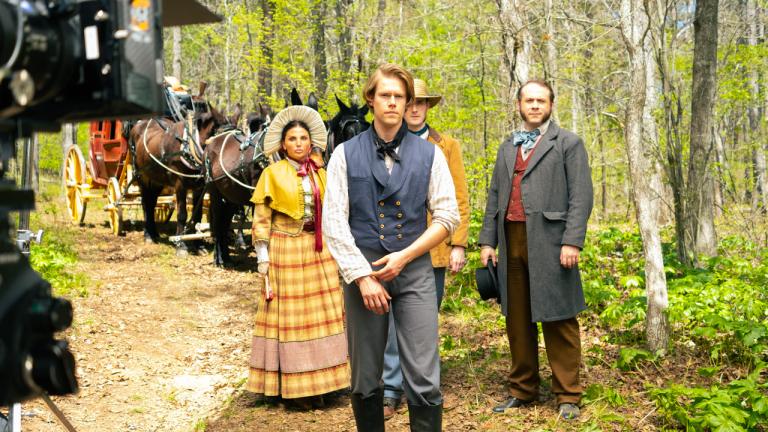
I had some oil that was consecrated for my anointing while in Kirtland. I took it and consecrated it again before the Lord for anointing the sick. I then bowed down before the Lord and prayed for the life of my companion, and I anointed her body with the oil in the name of the Lord. I laid my hands upon her, and in the name of Jesus Christ I rebuked the power of death and the destroyer, and commanded the same to depart from her, and the spirit of life to enter her body.
Her spirit returned to her body, and from that hour she was made whole; and we all felt to praise the name of God, and to trust in Him and to keep His commandments.
While this operation was going on with me (as my wife related afterwards) her spirit left her body, and she saw it lying upon the bed, and the sisters weeping. She looked at them and at me, and upon her babe, and, while gazing upon this scene, two personages came into the room carrying a coffin and told her they had come for her body. One of these messengers informed her that she could have her choice: she might go to rest in the spirit world, or, on one condition she could have the privilege of returning to her tabernacle and continuing her labors upon the earth. The condition was, if she felt that she could stand by her husband, and with him pass through all the cares, trials, tribulation and afflictions of life which he would be called to pass through for the gospel’s sake unto the end. When she looked at the situation of her husband and child she said: “Yes, I will do it!”
At the moment that decision was made the power of faith rested upon me, and when I administered unto her, her spirit entered her tabernacle, and she saw the messengers carry the coffin out at the door.
On the morning of the 6th of December, the Spirit said to me: “Arise, and continue thy journey!” and through the mercy of God my wife was enabled to arise and dress herself and walked to the wagon, and we went on our way rejoicing (Leaves from My Journal, Salt Lake City, 2d ed., 1882).
Posted from Cardiff, Wales



